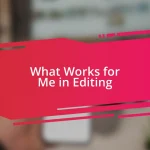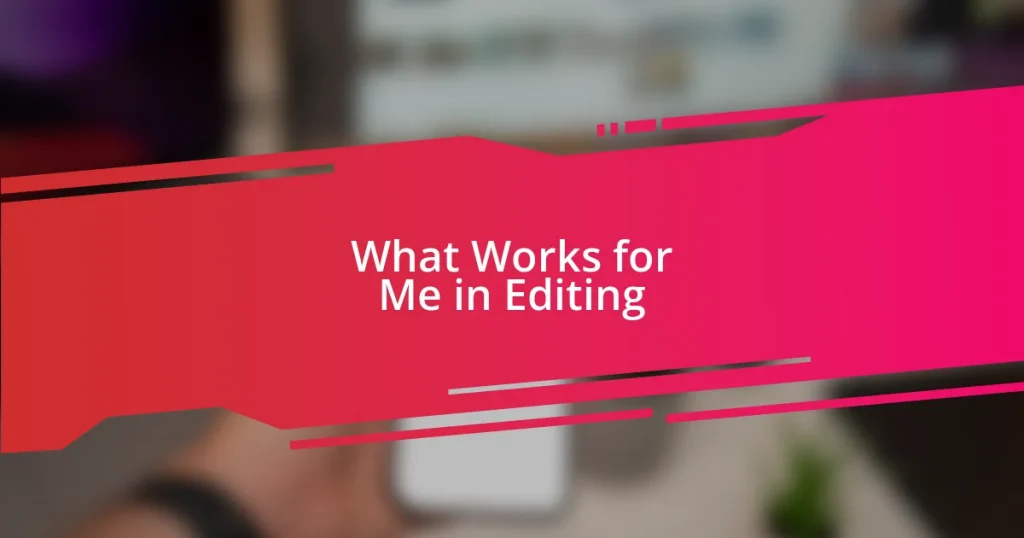Key takeaways:
- Writer’s block can arise from fear, perfectionism, and burnout, highlighting the need for self-awareness and balance.
- Establishing effective writing routines, such as scheduled sessions and creating a conducive environment, can significantly enhance creativity and productivity.
- Mindfulness practices and building a supportive writing community foster resilience, motivation, and shared experiences, crucial for overcoming creative obstacles.

Understanding Writer’s Block Causes
Sometimes, writer’s block sneaks up on us when we least expect it. I remember sitting at my desk, staring at a blank page, feeling the weight of unfulfilled expectations. It struck me then—was I actually afraid of what I might write? Fear is a significant contributor to writer’s block; it can create a mental barrier that transforms good ideas into paralyzing doubts.
Another cause of this frustrating phenomenon can be the overwhelming specter of perfectionism. I’ve had moments where I wouldn’t even start typing because I wanted every word to be flawless. This relentless pursuit of perfection can derail creativity, leaving us stuck in our own thoughts. Isn’t it fascinating how wanting to do something well can sometimes keep us from doing it at all?
Burnout is yet another villain in the writer’s block saga. I recall a time when I took on too many projects simultaneously, and the result was a creative drought that felt suffocating. The emotional toll of constant pressure to produce can stifle our inspiration and leave us feeling drained. Have you ever found yourself in a similar situation, where the joy of writing was eclipsed by stress? It’s a cycle that’s all too easy to get caught in, reminding us that sometimes, we need to step back and recharge.
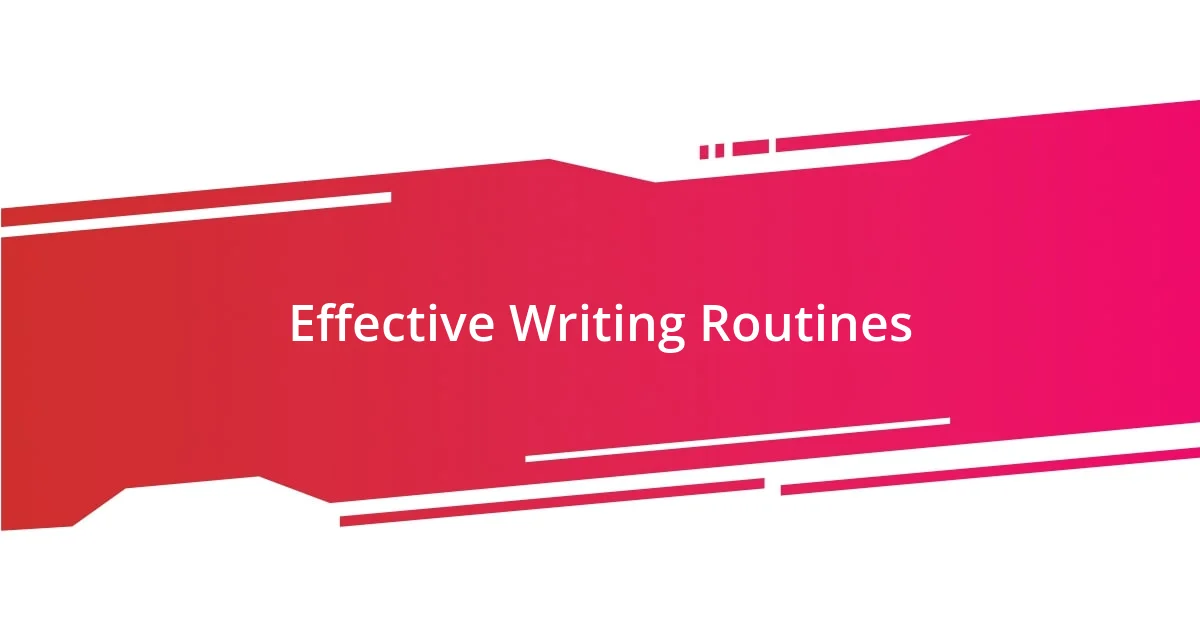
Effective Writing Routines
Using effective writing routines has been a game changer for me. Over time, I’ve learned that establishing a consistent schedule helps me tap into a creative flow. For example, I set aside mornings when I feel most energized to draft my initial thoughts, often achieving a surprising amount in just a couple of dedicated hours.
I also find value in the rituals that precede my writing sessions. Whether it’s brewing a cup of my favorite tea or taking a moment to meditate, these small practices signify to my brain that it’s time to shift into ‘writing mode.’ It’s remarkable how these little transitions help clear the mental clutter, paving the way for more fluid writing.
Another aspect I cherish is the environment I craft for writing. When I create a space that resonates with my creative energy—like my cozy nook filled with inspiring books and soft lighting—I notice a significant boost in my motivation. Have you tried changing up your workspace? Sometimes, simply altering our surroundings can breathe new life into our writing process.
| Routine | Description |
|---|---|
| Scheduled Writing | Dedicate specific times for writing sessions to cultivate consistency. |
| Pre-Writing Rituals | Engage in activities that signal to your brain it’s time to write. |
| Optimized Environment | Create a space that inspires you and eliminates distractions. |

Tools for Idea Generation
Tools for idea generation can make all the difference during those creative dry spells. I’ve relied on several tools that truly fire up my imagination. A particularly effective method is using mind maps; I find them thrilling because they allow me to visually explore my thoughts. There’s something liberating about connecting different ideas, almost like watching a puzzle come together.
Some tools I cherish for generating ideas include:
- Mind Mapping Software: Tools like XMind or MindMeister help create visual representations of thoughts.
- Prompt Generators: Websites like WritingExercises.co.uk can provide unexpected prompts that lead to fresh ideas.
- Free Writing: Set a timer for ten minutes and write whatever comes to mind—no filtering or editing—just let the words flow.
- Voice Recording Apps: Sometimes, speaking my ideas aloud with an app like Voice Memos unlocks a stream of inspiration I wouldn’t have captured otherwise.
- Collaboration Tools: Platforms like Miro allow brainstorming with others, bringing in new perspectives and ideas.
I recall a time when I was stuck on a difficult chapter and turned to a simple prompt generator. It provided a quirky scenario that sparked an unexpected direction in my story. It was a reminder that sometimes, the best ideas come when we least expect them, setting off exciting new paths for exploration.

Setting Realistic Writing Goals
Setting realistic writing goals is crucial to overcoming writer’s block. I’ve learned that breaking my larger writing projects into smaller, manageable tasks not only makes the process less daunting but also keeps me focused. For instance, instead of aiming to write a full chapter in one go, I aim to complete a specific number of paragraphs each session, which feels much more achievable.
I remember the first time I tried this approach. I was struggling with my novel and had all these lofty aspirations that only left me feeling defeated. Then, I set a goal of writing just 200 words a day. Surprisingly, it unlocked my creativity. Those small victories added up quickly, and I found myself exceeding my initial expectations more often than not. Isn’t it fascinating how tiny steps can lead to significant progress?
Another aspect I consider essential is making my goals specific and time-bound. For example, I once aimed to draft a blog post by the end of the week, but I structured it by saying, “I will write the introduction on Monday, the body on Tuesday, and the conclusion on Wednesday.” This clarity not only kept me on track but also gave me a sense of accomplishment with each completed section. How do you set your writing goals? By clearly defining them, you can create a personalized roadmap that keeps your motivation alive.
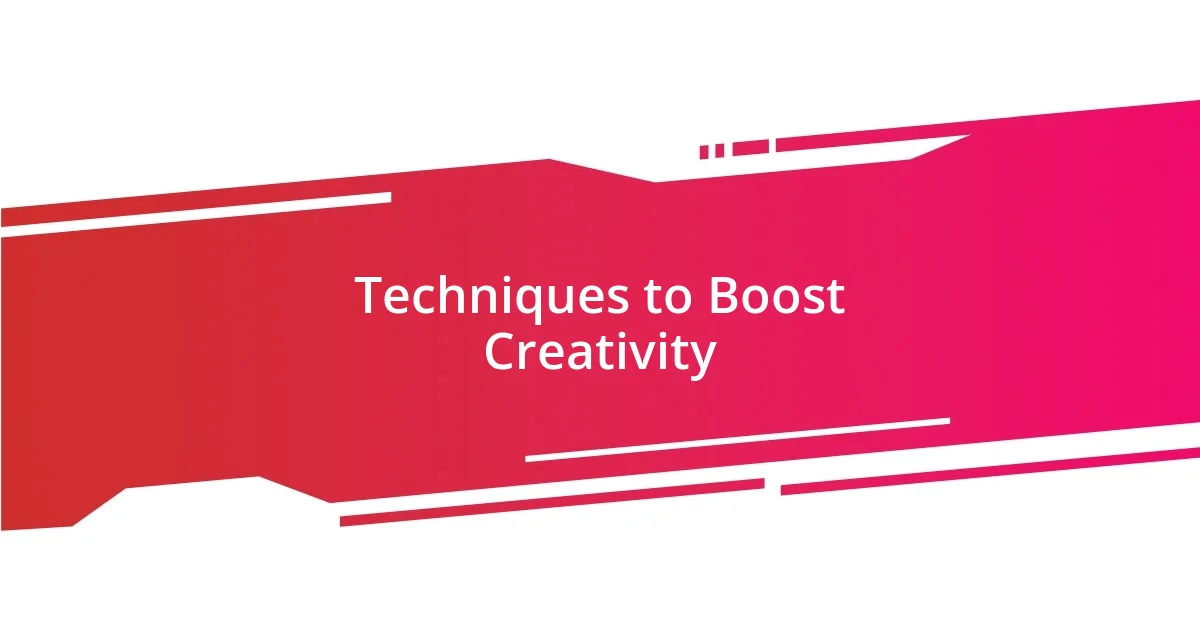
Techniques to Boost Creativity
One technique I’ve found invaluable is changing my environment. Just the other day, I was working from a crowded café, and the buzz of conversations sparked a new storyline in my head. It’s a stark contrast to my usual writing spot at home, where I might become too comfortable and stagnant. Have you ever noticed how simply relocating can ignite fresh ideas?
Another method that energizes my creativity is engaging with different mediums. I love exploring art, music, or nature as sources of inspiration. A while ago, I visited a local gallery filled with vibrant paintings, and the emotions they conveyed pushed me to experiment with colors in my writing. The connection between art and words is powerful—how can a single brushstroke influence your thought process?
I also practice the “two-hour rule,” which means dedicating two hours to something completely different—like gardening or cooking—before diving back into writing. I recall one Friday evening, I decided to try a new recipe, and in the process of chopping vegetables, I suddenly solved a plot problem that had haunted me for weeks. It’s surprising how stepping away can clarify your thoughts. Isn’t it remarkable how a little distance can clear the fog of writer’s block?
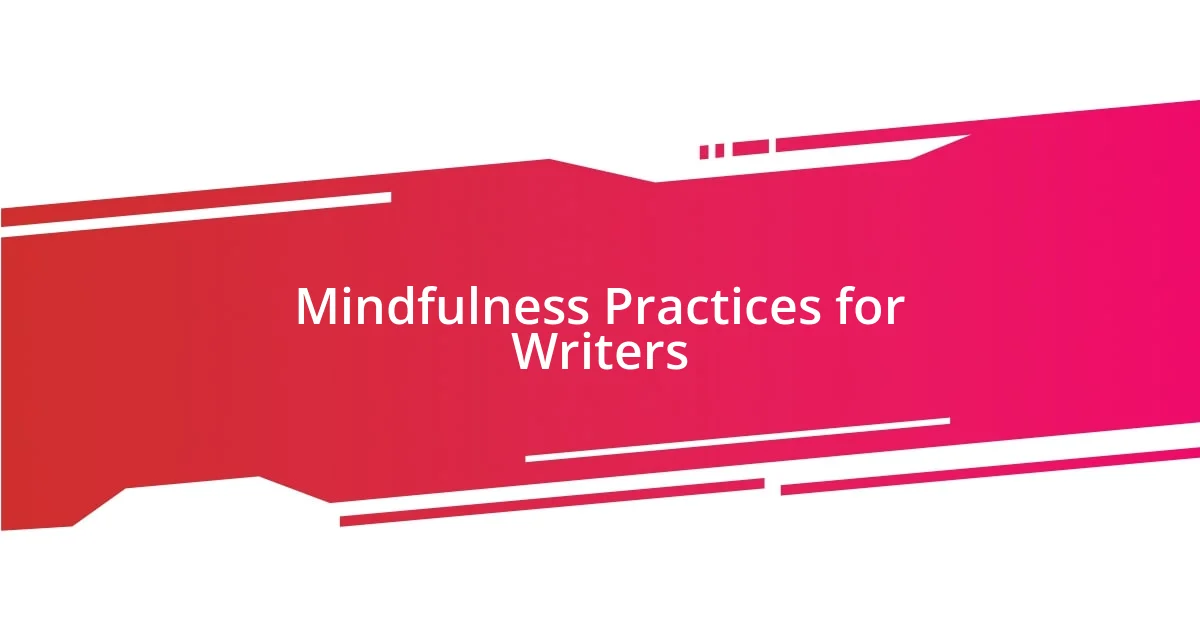
Mindfulness Practices for Writers
Mindfulness plays a significant role in my writing journey. I consciously set aside a few minutes each day to practice deep breathing. I close my eyes, inhale deeply, and just focus on the sensation of the air filling my lungs. This simple act helps clear mental clutter and cultivates a space where creativity can thrive. Have you tried focused breathing before? It’s amazing how it can ground you when the weight of writing expectations feels overwhelming.
In addition to breathing exercises, I often engage in mindful journaling. I allow myself to write without judgment, pouring out thoughts or feelings onto the page. Just last week, I found myself reflecting on my challenges with a new project. It was eye-opening to see my fears laid out, and by acknowledging them, I felt more empowered to tackle my writing head-on. Do you ever find that writing about your experiences can lead to greater self-awareness? I truly believe this practice can steer you away from the blocks that halt progress.
Sometimes, I like to incorporate short walks into my routine. I’m always impressed by how a simple stroll in nature can clear my head. The rhythmic sound of my footsteps combined with the sights and sounds around me helps me gain perspective on my projects. Just a few days ago, while walking, a vivid scene for an upcoming story came to me almost effortlessly. Who knew that stepping away from my desk could bring such clarity? It serves as a reminder that sometimes, to move forward, we may need to take a step back.
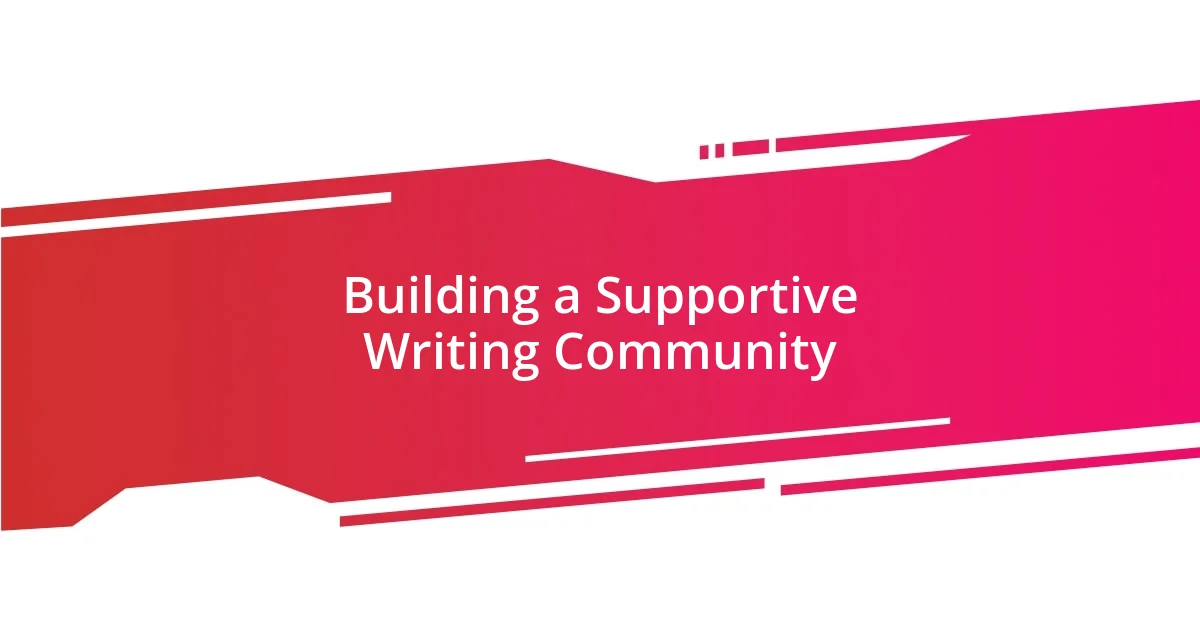
Building a Supportive Writing Community
Building a supportive writing community has been a game-changer for me. I remember joining a local writers’ group, feeling a mix of excitement and nervousness. At first, sharing my work felt incredibly vulnerable, but receiving feedback from fellow writers encouraged me to refine my craft. Have you ever shared your writing with others? It’s revealing how much camaraderie can lift our spirits and fuel creativity.
Connecting with other writers online has been another boost. I’ve found platforms where writers from around the world share ideas, struggles, and triumphs. Just last month, one member posted about a creative rut, and reading her experience made me reflect on my own. It was comforting to realize that we all face similar challenges, sparking conversations that reminded us we are not alone in this journey. Isn’t that sense of community reassuring?
I also believe in the power of accountability. Having a writing buddy has helped me commit to my goals. We check in regularly, sharing progress and encouraging each other on tough days. Recently, she shared a breakthrough she had after implementing something I suggested. It felt exhilarating to play a part in her success! How do you find motivation to keep writing? Sometimes, just knowing someone else is cheering for you can make all the difference.
